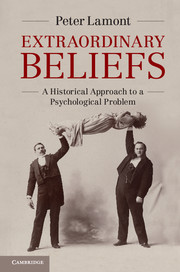Book contents
- Frontmatter
- Contents
- A brief reflexive preface
- Acknowledgements
- ONE Introduction
- TWO The making of the extraordinary
- THREE The making of mesmeric phenomena
- Four The making of spiritualist phenomena
- FIVE The making of psychic phenomena
- SIX The making of paranormal phenomena
- SEVEN The making of extraordinary beliefs
- Notes
- Bibliography
- Index
SEVEN - The making of extraordinary beliefs
Published online by Cambridge University Press: 05 April 2013
- Frontmatter
- Contents
- A brief reflexive preface
- Acknowledgements
- ONE Introduction
- TWO The making of the extraordinary
- THREE The making of mesmeric phenomena
- Four The making of spiritualist phenomena
- FIVE The making of psychic phenomena
- SIX The making of paranormal phenomena
- SEVEN The making of extraordinary beliefs
- Notes
- Bibliography
- Index
Summary
Since the days of mesmerism, there have been countless demonstrations of extraordinary feats, most of which, if real, would now be classed as paranormal. These have been reported by observers, and framed in various ways by those who have seen, heard or read about them. The demonstrations have been designed to be convincing, by being demonstrated in ways that seem to exclude ordinary explanations such as chance and fraud. The demonstration and reporting of these events have been accompanied by regular arguments about expertise (about who was competent to assess whether ordinary explanations had been excluded), about how extraordinary they were (in particular, in relation to contemporary science) and about the desirability of the claims being made. In the process, beliefs have been formed.
In disputing these events, everyone has appealed to the facts, though they have often disagreed about what happened, and even when they have agreed about the facts, they have been able to frame what happened in support of either belief or disbelief. Any unexplained feat could be framed as chance or fraud, and any failure, duplication or exposure as evidence in support of the reality of the phenomena. For all the changes in the terms that have been used to refer to events that were part of contemporary debates about mesmerism, spiritualism, psychical research and parapsychology, there have been remarkable continuities. In short, we have been having a very similar argument for a very long time. Some of the continuities should be clear by now, but a broader discussion might be useful, based upon how beliefs about such phenomena have been expressed since the early nineteenth century.
- Type
- Chapter
- Information
- Extraordinary BeliefsA Historical Approach to a Psychological Problem, pp. 242 - 259Publisher: Cambridge University PressPrint publication year: 2013



